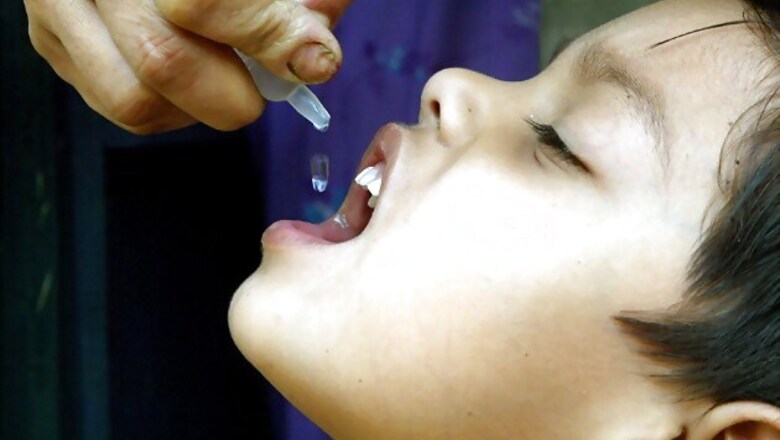
views
Islamabad: A powerful Pakistani Taliban faction has said it will not allow an anti-polio campaign to be conducted in its stronghold of North Waziristan tribal region as long as US drone strikes continue in the area.
The group led by commander Hafiz Gul Bahadur distributed a pamphlet on Saturday that announced the ban on the government's polio vaccination campaign.
The ban has raised concerns about the spread of polio in a region with poor healthcare facilities, and local tribesmen said they had no option but to accept the Taliban's directive.
The pamphlet in Urdu, distributed in Miranshah, the main town of North Waziristan, said: "We announce a ban on polio vaccination campaign from today (Saturday)."
It warned local residents that "violators will have no right to register a complaint if they are harmed". "Chief of the Shura-e-Mujahideen, North Waziristan, Hafiz Gul Bahadar sahab, has decided in consultation with his shura (council) to impose a ban on polio vaccination unless drone strikes are stopped in Waziristan," the pamphlet said.
Defending the ban, the Taliban faction said the impact of the drone campaign was worse than the spread of polio. The pamphlet cited fears of espionage as another reason for the ban and mentioned the case of Shakeel Afridi, the government doctor who was recently given a 33-year prison term after being arrested for helping the CIA track Osama bin Laden last year.
"The well-wishers (the US) spend billions of rupees on the polio vaccination campaign. They know that polio could affect only a few among hundreds of thousands of people. At the same time, the well-wishers (the US), with the help of their Pakistani slaves, are carrying out drone strikes. As a result, hundreds of our Waziristani innocent children, women and aged men have been martyred," the pamphlet said.
The day and night flights of the US unmanned spy planes have made almost every Waziristan resident "psychologically sick" and this situation was worse than the spread of polio, the pamphlet claimed.
"That is why we have announced a ban on polio vaccinations," the pamphlet said. There was no official word on the Taliban ban as political authorities in North Waziristan Agency have little say in running the affairs of the region, which US and Afghan officials have described as a safe haven for Taliban and Al Qaeda elements.
Tribesmen said a total of 18 polio cases had been reported in North Waziristan this year, including seven among families displaced by fighting between security forces and militants in South Waziristan Agency.
A military operation in South Waziristan had displaced tens of thousands of people, many of whom had migrated to North Waziristan.
In March, health authorities said a seven-month old child in North Waziristan Agency had been diagnosed with polio. Experts in the National Institute of Health in Islamabad said the child was infected with a strain of the polio virus that was found in 14 cases previously registered in Waziristan, proving that the virus was prevalent in the region.
A local leader said several polio cases were detected this year in Datta Khel area, which has witnessed several US drone strikes.
The residents of Datta Khel had refused to administer anti-polio drops to children. A total of 11 polio cases were reported in North Waziristan last year.
The US has stepped up its drone campaign in Waziristan since late May and dozens have been killed in missile strikes by the CIA-operated spy planes.
The ban on the anti-polio campaign was the second major decision made by Taliban militants in a week in the restive Waziristan tribal region that could affect tribesmen.
Last week, the banned Tehrik-e-Taliban Pakistan asked Mehsud tribesmen in South Waziristan to leave their homes, saying the militants were in a state of war with the Pakistan government.
A Taliban pamphlet had warned all contractors and NGO workers would be targeted by militants as they had never been allowed to work in South Waziristan.
















Comments
0 comment